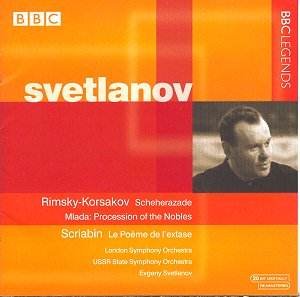I approached this CD with keen anticipation as
Evgeny Svetlanov (1928-2002) was a noted interpreter of Russian
music. Furthermore, here we can hear him working with two orchestras
with whom he was closely associated. He was chief conductor of
the USSR State Symphony Orchestra from 1965 to 2000 and from the
1970s onwards he appeared regularly with the LSO, becoming their
principal guest conductor in 1979.
The main work offered here, Scheherazade,
must have been meat and drink to Svetlanov, for it is full
of colour and incident. He gets the LSO to play excellently for
him and leader John Georgiadis spins a subtle and sensuous line
in his solos. However, I should sound a word of warning that some
listeners may find that some of Svetlanov’s tempi are a bit too
broad. You’ll note that he takes nearly 49 minutes to play the
work whereas Fritz Reiner takes 44’22", Beecham 45’36"
and Sir Charles Mackerras in his 1990 reading with the LSO (Telarc)
takes 44’47"
Good though it is, his performance seemed to
me to be missing sometimes the sense of urgency and elemental
power that one finds in Reiner’s great 1960 account for RCA with
the Chicago Symphony Orchestra. This is especially true of the
first movement which seems just a bit too broad though some listeners
may well enjoy the extra weight. Also there were times when I
wanted the extra bit of sparkle and wit that Beecham finds in
the score in his 1957 EMI recording with the RPO. Compare, for
instance, the phrasing in the infectious bassoon solo at the start
of the second movement, ‘The Story of the Kalender Prince’(track
3). However, the final pages of that movement (track 3, from 9’58")
are very delicately and atmospherically done here before Svetlanov
whips up a final blaze to close the movement.
The strings have great warmth in the opening
paragraphs of ‘The Young Prince and the Young Princess’ (track
4) although some listeners might feel that Svetlanov is just a
touch too indulgent here (personally, I like it!) Later on in
this movement there’s more first rate wind playing to enjoy; the
LSO were on fine form that night! The finale has dash and purpose
and, like the rest of the piece, is powerfully articulated and
projected but I did feel that perhaps just a little more abandon
would have made a good performance into a very good one. However,
there is much to admire in the performance of the work as a whole
and many collectors will relish the combination of a virtuoso
British orchestra and a great Russian maestro
As it happened, the first time I played the disc
I began with Scheherazade (which is the second item
in the programme. Thus it was only later that I played the brief
march from Mlada (track 1). This is a buoyant, glittering
performance, full of life and colour and it makes a really infectious,
bright and breezy curtain raiser.
The concert closes in splendid style too with
an overwhelming account of Scriabin’s hedonistic tone poem. The
Prom from which this performance emanates was something of a special
occasion for unfortunate, non-musical reasons. It was the second
of two Proms that Svetlanov and his band had given on consecutive
evenings. The day before this concert (21 August) the Soviet army
had rolled into Czechoslovakia amid great controversy. I’m sure
that emotions were pretty raw in the Albert Hall on these two
evenings and the Russians play here as if they had a point to
prove. They give an overwhelming, intense account of Scriabin’s
score. The performance may be a little lacking in subtlety but
it has enormous power and vitality and at the end the audience
reaction is wildly enthusiastic.
I must say that when I saw the contents of this
CD I was a bit disappointed to find "yet another" Poem
of Ecstasy on a BBC Legends CD – they already have at least
two performances, both by Stokowski, in their catalogue. However,
the impact of Svetlanov’s performance fully vindicates its inclusion
in the series.
There’s a useful note about Svetlanov by David
Patmore, of which French and German translations are offered,
and the sound quality is good. This disc is a very good example
of the work of a fine Russian conductor and I recommend it confidently.
John Quinn
